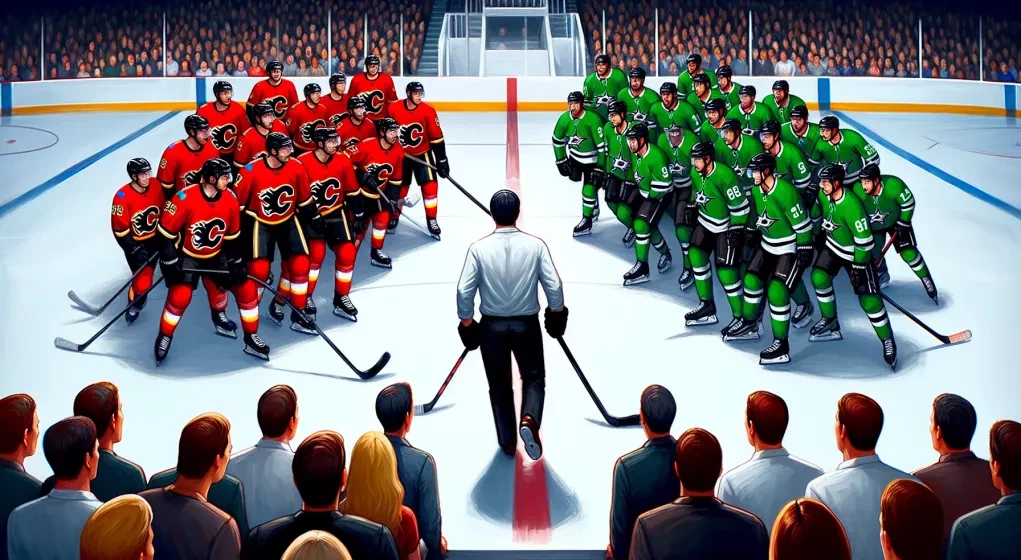In the waning hours of a crisp Wednesday evening, the tides of change swept through the ranks of the Calgary Flames. The speculation that had been churning in the hockey world’s undercurrents for months came to a climactic fruition, as the team’s stoic blueliner, Chris Tanev, was ushered to the beckoning embrace of the Dallas Stars. The exchange saw the Flames bolster their future potential with a 2024 second-round draft pick, a conditional 2026 third-rounder, and the young talent that is Artem Grushnikov.
Whispers had long been floating of Tanev’s tenure with the Flames reaching its endgame. Faced with an expiring contract, and negotiations for renewal stalling like an engine in the cold, the Flames organization stood on a precipice. It was a game of foresight and strategy to not let Tanev vanish into free agency without a trace, or recompense.
Flames General Manager Craig Conroy, a wily tactician of the rink, shared insights with TSN in the aftermath, revealing the prudence involved in navigating the trade landscape. “Over the last while, you’re talking with teams and you’re trying to get a feel of what the value is out there,” Conroy articulated with the candidness of a seasoned chess player eyeing his board.
Conroy painted a picture of diligence; scouts dispatched to appraise the Stars’ roster, in search of a piece to dovetail seamlessly into Calgary’s assemblage.
Attention had also swirled around Tanev’s erstwhile defensive compatriot, Noah Hanifin. Like Tanev, Hanifin is encroaching upon free agency, with his name fueling the rumor mills. The pursuit for Tanev had been a high-stakes one, with the Flames reportedly questing for a first-round pick. Nonetheless, the market dictates its own terms, and adaptability is the hallmark of the sagacious.
Conroy extolled the merits of the acquired assets. Grushnikov, the youthful aspirant, held a mirror to Tanev’s qualities, a defensive stalwart with latent possibilities, reinforcing the Flames’ offensive-leaning blueline talent.
Tanev’s legacy within the Flames was one inscribed in the annals of resolve and leadership. He had become a bulwark of the team’s defensive line, sixth in franchise history with 566 blocked shots; seventh in plus-minus ratings; a beacon of dedication and exemplary effort. His departure leaves behind an indelible ethos, a standard for Calgary’s budding defensemen to aspire to.
Conroy waxed eloquent about culture, tying Tanev’s intrinsic impact to the fabric that binds the team together. The loss, though felt, morphs into an impetus for others to shoulder the mantle.
The Flames’ resilience is not unfamiliar with the comings and goings of pivotal figures. Notably, following the trade of Elias Lindholm at the All-Star juncture, the team has surged, showcasing an adaptable spirit.
This resilience was echoed by Nazem Kadri, the Flames’ leading scorer, who on the cusp of the Tanev trade, expressed his reticence to succumb to defeatism. “I’m never really on board to be a seller,” Kadri declared. His optimism for Calgary’s squad was infectious, a testament to the unyielding character dwelling within the locker room.
Conroy drew parallels between Kadri’s sentiments and the team’s enduring fortitude. As they brace for the departure of their best defensive soldier, the Flames embody the ‘next man up’ mentality, a pack of hyenas hungry for continued success.
Moving forward, Conroy’s message was clear. The onus belongs to the players on the ice, to maintain their integrity as consummate professionals, leaving the chess moves of the organization to him.
As the Flames converge on Pittsburgh for their next challenge, eyes will sharpen to see how this team, rebalanced by trade winds, will define its next chapter. They skate on, steadfast, fueled by the legacy left by Tanev, propelling toward the uncertain and thrilling future that is the very soul of the sport.






